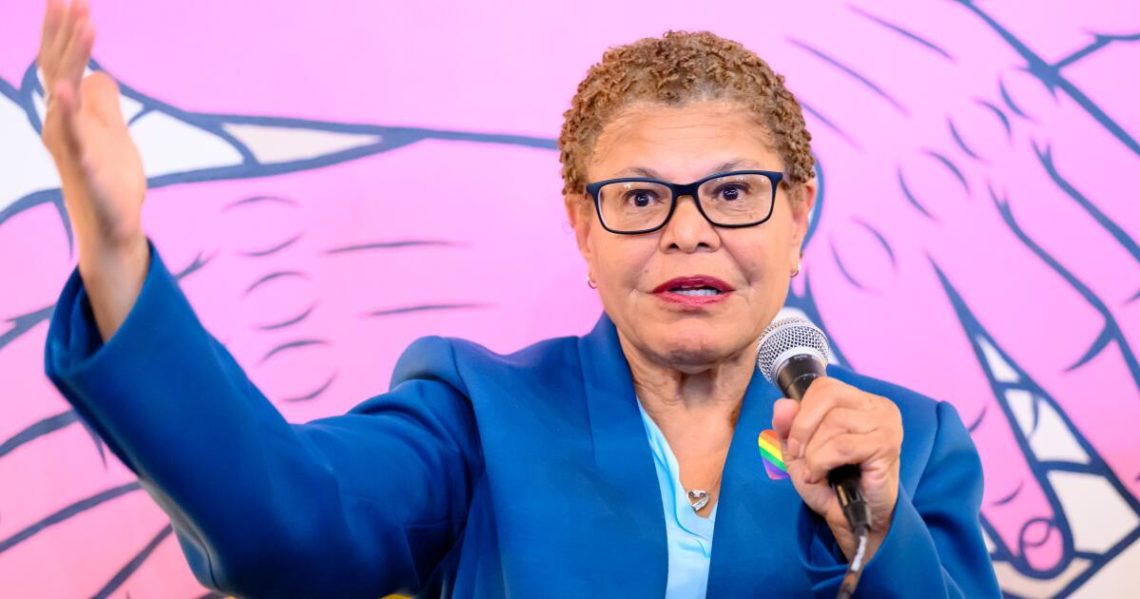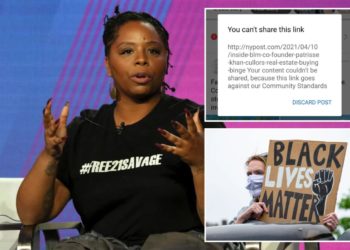It was the first and possibly the most dramatic act by Los Angeles Mayor Karen Bass after she took office: declaring a city emergency on homelessness.
That move, backed by the City Council, gave Bass the power to award no-bid contracts to nonprofit groups and to rent hotels and motels for interim homeless housing. It also allowed Bass to waive regulations limiting the size and scale of certain types of affordable housing.
Now, two and a half years into Bass’ tenure, some on the council are looking to reassert their authority, by rescinding the homelessness emergency declaration.
Councilmember Tim McOsker said he wants to return city government to its normal processes and procedures, as spelled out in the City Charter. Leases, contracts and other decisions related to homelessness would again be taken up at public meetings, with council members receiving testimony, taking written input and ultimately voting.
“Let’s come back to why these processes exist,” McOsker said in an interview. “They exist so the public can be made aware of what we’re doing with public dollars.”
McOsker said that, even if the declaration is rescinded, the city will need to address “the remainder of this crisis.” For example, he said, the homeless services that the city currently provides could become permanent. The city could also push county agencies — which provide public health, mental health counseling and substance abuse treatment — to do more, McOsker said.
Bass, for her part, pushed back on McOsker’s efforts this week, saying through an aide that the emergency declaration “has resulted in homelessness decreasing for the first time in years, bucking statewide and nationwide trends.”
“The Mayor encourages Council to resist the urge of returning to failed policies that saw homelessness explode in Los Angeles,” said Bass spokesperson Clara Karger.
The Los Angeles Homeless Services Authority, also known as LAHSA, reported last summer that homelessness declined by 2.2% in the city of L.A., the first decrease in several years. The number of unsheltered homeless people — those who live in interim housing, such as hotels and motels, but do not have a permanent residence — dropped by more than 10% to 29,275, down from 32,680.
The push from McOsker and at least some of his colleagues comes at a pivotal time.
Last month, the L.A. County Board of Supervisors voted to pull more than $300 million from LAHSA, the city-county agency that provides an array of services to the unhoused population.
Meanwhile, the L.A. Alliance for Human Rights, which has been battling the city in court over its response to the crisis, is pushing for a federal judge to place the city’s homelessness initiatives into a receivership.
Matthew Umhofer, an attorney for the alliance, said the city has “very little to show” for its emergency declaration in terms of progress on the streets.
“It’s our view that a state of emergency around homelessness is appropriate, but that the city is not engaged in conduct that reflects the seriousness of the crisis — and is not doing what it needs to do in order to solve the crisis,” he said.
Inside Safe, Bass’ signature program to bring homeless people indoors, has moved 4,316 people into interim housing since it began in 2022, according to a LAHSA dashboard covering the period ending April 30. Of that total, nearly 1,040 went into permanent housing, while nearly 1,600 returned to homelessness.
Council members voted this week to extend the mayor’s homelessness emergency declaration for another 90 days, with McOsker casting the lone dissenting vote. However, they have also begun taking preliminary steps toward ending the declaration.
Last week, while approving the city budget, the council created a new bureau within the Los Angeles Housing Department to monitor spending on homeless services. On Tuesday, the council asked city policy analysts to provide strategies to ensure that nonprofit homeless service providers are paid on a timely basis, “even if there is no longer a declared emergency.”
The following day, McOsker and Councilmember Nithya Raman — who heads the council’s housing and homeless committee — co-authored a proposal asking city policy analysts to report back in 60 days with a plan addressing the “operational, legal and fiscal impacts” of terminating the emergency declaration.
That proposal, also signed by Councilmembers John Lee and Ysabel Jurado, now heads to Raman’s committee for deliberations.
While some on the council have already voiced support for repealing the emergency declaration, others say they are open to the idea — but only if there is a seamless transition.
“I want to make sure that if we do wind it down, that we do it responsibly,” said Councilmember Bob Blumenfield, who represents the southwest San Fernando Valley.
Blumenfield wants to protect Executive Directive 1, which was issued by Bass shortly after she declared the local emergency, by enshrining its provisions into city law. The directive lifts height limits and other planning restrictions for 100% affordable housing developments, which charge rents below market rates.
Raman said the city must confront a number of issues stemming from the homelessness crisis, such as improving data collection. But she, too, voiced interest in exploring the end of the emergency declaration.
“This is also an extremely important conversation, and it is one I am eager to have,” she said.
The post L.A.’s mayor declared a homelessness emergency. Now, some at City Hall want to move past it appeared first on Los Angeles Times.




